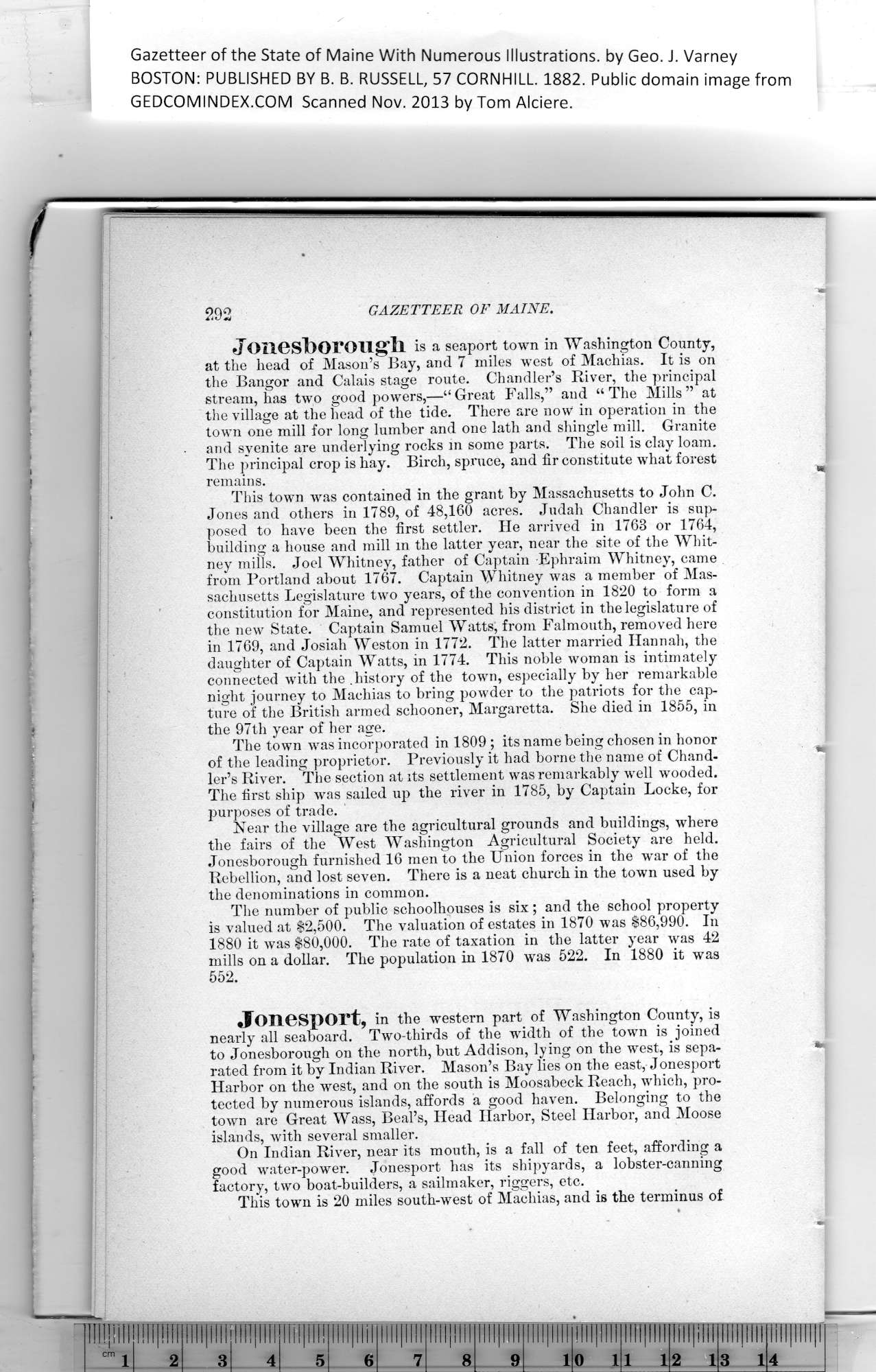|
Gazetteer of the State of Maine With Numerous Illustrations, by Geo. J. Varney
BOSTON: PUBLISHED BY B. B. RUSSELL, 57 CORNHILL. 1882. Public domain image from
292 GAZETTEER OF MAINE.
OIlGSllOrOUg’ll is a seaport town in Washington County,
at the head of Mason’s Bay, and 7 miles west of Machias. It is on
the Bangor and Calais stage route. Chandler’s River, the principal
stream, has two good powers,—“Great Falls,” and “The Mills” at
the village at the head of the tide. There are now in operation in the
town one mill for long lumber and one lath and shingle mill. Granite
and syenite are underlying rocks in some parts. The soil is clay loam.
The principal crop is hay. Birch, spruce, and fir constitute what forest
remains.
This town tvas contained in the grant by Massachusetts to John C.
Jones and others in 1789, of 48,160 acres. Judah Chandler is sup-
posed to have been the first settler. He arrived in 1763 or 1764,
building a house and mill m the latter year, near the site of the Whit-
ney mills. Joel Whitney, father of Captain Ephraim Whitney, came
from Portland about 1767. Captain Whitney was a member of Mas-
sachusetts Legislature two years, of the convention in 1820 to form a
constitution for Maine, and represented his district in the legislature of
the new State. Captain Samuel Watts, from Falmouth, removed here
in 1769, and Josiah Weston in 1772. The latter married Hannah, the
daughter of Captain Watts, in 1774. This noble woman is intimately
connected with the .history of the town, especially by her remarkable
night journey to Machias to bring powder to the patriots for the cap-
ture of the British armed schooner, Margaretta. She died in 1855, in
the 97tli year of her age.
The town was incorporated in 1809 ; its name being chosen in honor
of the leading proprietor. Previously it had borne the name of Chand-
ler’s River. The section at its settlement was remarkably well wooded.
The first ship was sailed up the river in 1785, by Captain Locke, for
purposes of trade.
Near the village are the agricultural grounds and buildings, where
the fairs of the West Washington Agricultural Society are held.
Jonesborough furnished 16 men to the Union forces in the war of the
Rebellion, and lost seven. There is a neat church in the town used by
the denominations in common.
The number of public schoolhouses is six; and the school property
is valued at $2,500. The valuation of estates in 1870 was $86,990. In
1880 it was $80,000. The rate of taxation in the latter year was 42
mills on a dollar. Tbe population in 1870 was 522. In 1880 it was
552.
Jonesport, in the western part of Washington County, is
nearly all seaboard. Two-thirds of the width of the town is Joined
to Jonesborongh on tbe north, but Addison, lying on the west, is sepa-
rated from it by Indian River. Mason’s Bay lies on the east, Jonesport
Harbor on the'west, and on the south is Moosabeck Reach, which, pro-
tected by numerous islands, affords a good haven. Belonging to tbe
town are Great Wass, Beal’s, Head Harbor, Steel Harbor, and Moose
islands, with several smaller.
On Indian River, near its mouth, is a fall of ten feet, affording a
good water-power. Jonesport has its shipyards, a lobster-canning
factory, two boat-builders, a sailmaker, riggers, etc.
This town is 20 miles south-west of Machias, and is the terminus of
PREVIOUS PAGE ... NEXT PAGE
This page was written in HTML using a program written in Python 3.2
|
